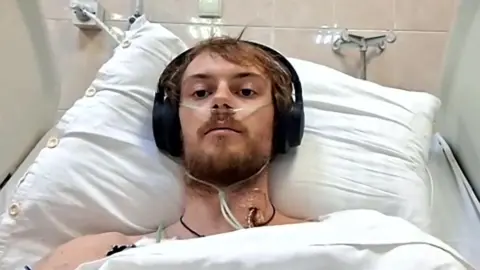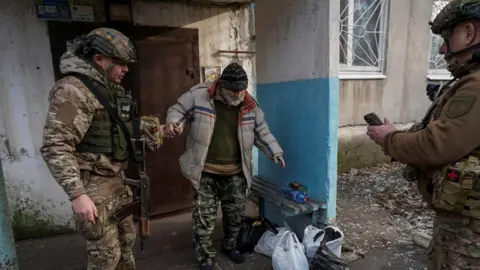Ukraine aid workers 'face growing drones threat'
 BBC
BBCVolunteer workers in Ukraine have said they face a growing threat from Russian drones.
Edward, who lost his leg and arm in an explosion on 30 January, said his marked vehicle was attacked in what amounted to a war crime.
The Dorset aid worker, who had been helping evacuees from the front line town of Pokrovsk, said Russian forces were using a new type of drone that could not be picked up by detecting equipment.
Karol Swiacki, from Bournemouth charity Ukraine Relief, said his volunteers had recently stopped driving marked vehicles for fear of being targeted.
Aid workers say about 7,000 people remain in Pokrovsk, despite constant attacks from Russian forces less than 2km (1.2 miles) away.
Edward, whose surname is not being used by the BBC, said he was driving through the town in a vehicle marked with the words "evacuation" and "volunteer".
He said: "I heard a drone and then 30 seconds later there was this mighty bang, [an] explosion right in front of my face.
"I could see my arm on the wheel not moving. My leg was just absolutely shredded."
 Reuters
ReutersEdward said his team had previously been attacked by a Russian drone in December, although no-one was seriously hurt.
He said: "Pokrovsk is littered with drones. Every time we go in, we see them.
"We have several detectors... and neither of those went off before the strike, which leads us to think that it could have been a fibre-optic, which is a new drone, a much, much more dangerous type of drone they've been using recently.
"It's undetectable and pretty much impossible to counter."
Mr Swiacki said the war in Ukraine had "changed completely" in recent months.
He said: "There are thousands of drones and when you are driving, we are driving the van without marks because Russians are striking into every vehicle especially those which are marked as the humanitarian aid.
"In the last few months, it was never as scary as in the last few minutes when you drive too close to the cities.
"You have to look in the sky and you are afraid."
You can follow BBC Dorset on Facebook, X, or Instagram.
